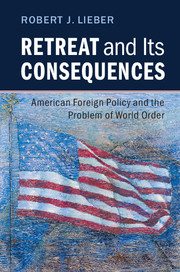Book contents
- Frontmatter
- Dedication
- Contents
- List of figures and tables
- Acknowledgments
- Introduction
- 1 Foreign policy retreat and the problem of world order
- 2 Burden sharing with Europe: problems of capability and will
- 3 Middle East policy: regional conflicts and threats to national interest
- 4 BRICS: stakeholders or free-riders?
- 5 Retreat and its consequences
- 6 Can America still lead – and should it?
- Index
Introduction
Published online by Cambridge University Press: 05 May 2016
- Frontmatter
- Dedication
- Contents
- List of figures and tables
- Acknowledgments
- Introduction
- 1 Foreign policy retreat and the problem of world order
- 2 Burden sharing with Europe: problems of capability and will
- 3 Middle East policy: regional conflicts and threats to national interest
- 4 BRICS: stakeholders or free-riders?
- 5 Retreat and its consequences
- 6 Can America still lead – and should it?
- Index
Summary
Is the active engagement and leadership of a powerful America essential for its own security and the maintenance of world order? In recent years, that long-standing logic of American foreign policy has been called into question and we have been witnessing a change in foreign policy as America has gradually but unmistakably been pulling back from its customary international role. But does a foreign policy strategy of retrenchment and selective disengagement enhance or threaten America's own national interests and the stability of global order?
In seeking to answer these questions, this work builds in part upon my two latest books. In The American Era: Power and Strategy for the 21st Century (Cambridge University Press, 2005 and 2007), I argued that external threats, the weakness of international institutions in confronting global dangers, and the unique strength and power of the United States combined to make a grand strategy of active engagement a necessary adaptation to the realities of the post-9/11 world. This orientation seemed vital not only for the benefit of America's own national security but also for the stability of the international order.
That book and intensified debates about the effects and legitimacy of American foreign policy led to a subsequent project in which I asked the question of whether the United States still possessed the capacity to continue this distinctive role or if changes occurring both abroad and at home meant that it could or should no longer do so. In that work, Power and Willpower in the American Future: Why the United States is Not Destined to Decline (Cambridge University Press, 2012), I concluded that America's material strengths remained substantial, but a series of policy problems, institutional limits, normative questions, and political polarization had become more central in shaping and constraining the role of the United States.
That background, together with increasing and largely unpredicted crises in the Middle East (ISIS, Iraq, Syria, Libya, and Yemen), Eastern Europe (Russia's breach of the post-1945 European order), and elsewhere leads me to the new work. In this, I examine the implications of a reduced US role. This pattern of foreign policy retrenchment is a consequence of choices made by the administration of President Barack Obama, in the context of events that have occurred in the past decade and a half.
- Type
- Chapter
- Information
- Retreat and its ConsequencesAmerican Foreign Policy and the Problem of World Order, pp. 1 - 5Publisher: Cambridge University PressPrint publication year: 2016



